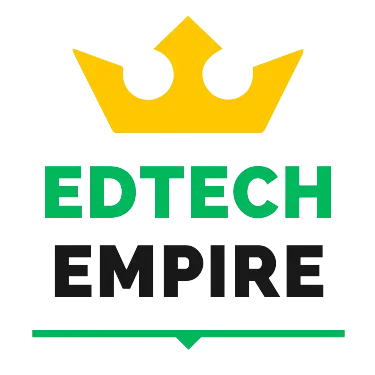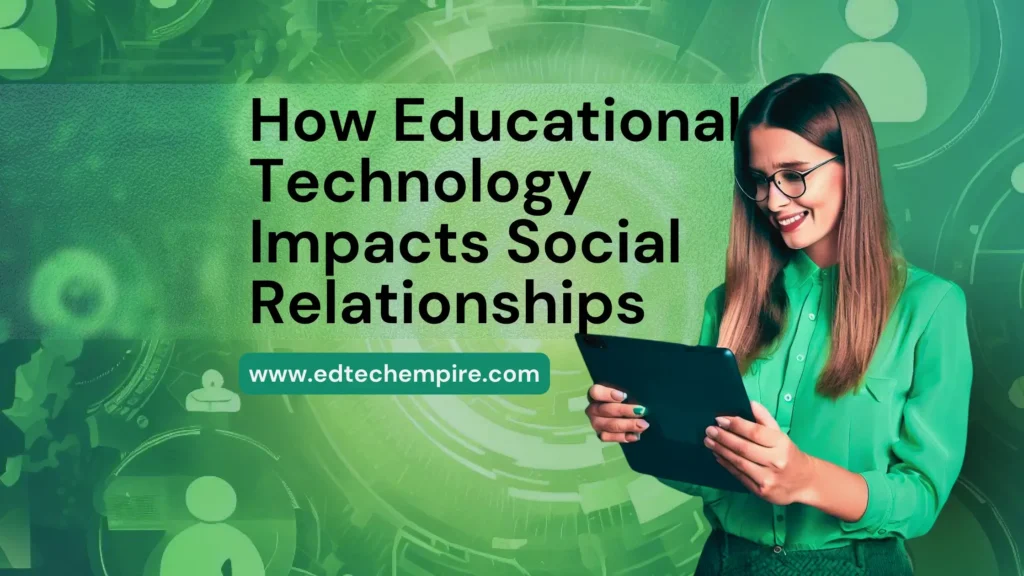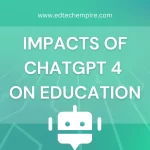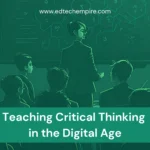![]()
Educational technology is all the rage these days. You know, using digital gadgets and goodies to make teaching and learning more fun and effective. It’s pretty much a must-have for modern education, especially since COVID-19 turned everything upside down. But what does educational technology do to our social lives? How educational technology impacts social relationships? Does it bring us closer or push us apart? In this blog post, we will dig into the history, perks, and pitfalls of educational technology for social interaction.
Table of Contents
How Educational Technology Has Changed Social Interaction
Let’s now focus on How educational technology impacts social relationships. Educational technology has come a long way. From old-school radio and TV to fancy computers and smartphones. These tools, technology, and gadgets have opened up new ways of talking and working together for learners and educators, like online classes, video chats, social media, and games. Educational technology has also made learning more accessible and diverse, letting learners mingle with folks from different backgrounds, cultures, and viewpoints.
Benefits of Edtech for Enhancing Social Relationships
Edtech rocks for socializing, and here’s why. First of all, it lets you chat and get feedback from your peers and teachers, so you feel like you’re part of a tribe. You can exchange ideas, insights, and compliments with them, and get some honest advice and support along the way. Then, it makes working with others a breeze, sharpening your brain and creativity. You can team up on assignments, crack puzzles together, and learn from each other’s skills and talents. And finally, it helps you grow as a person, learning how to be kind, strong, and chill. You can improve your social skills, deal with setbacks and pressure, and manage your own moods and actions.
Challenges of Educational Technology for Maintaining Social Relationships
Edtech can also be a drag for socializing, and here’s how. One of the main hassles is the drop in face-to-face interaction among learners and educators. This can make you feel like you’re living in a cave, with no one to hang out with or connect to. You can miss out on the fun and warmth of human contact, and feel less engaged and motivated. You can also lose the opportunity to learn from each other’s body language, expressions, and gestures. Another hassle is the risk of misusing or abusing Edtech, such as being nasty online, ripping off someone else’s work, or cheating on quizzes. These behaviors can wreck the vibe and trust among learners and educators. You can lose your reputation, credibility, and confidence, and hurt others in the process. You can also face serious consequences such as lower grades, academic probation, or legal action.
Frequently Asked Questions (FAQs):
Q: Does using educational technology make me less sociable?
A: No way! Edtech is actually a social butterfly’s dream come true. It opens up a world of different perspectives, cultures, and opinions, making you more worldly than a travel blogger. Plus, you can connect with fellow learners and wise educators online, collaborating on projects, chatting up a storm, and even getting some constructive feedback on your latest masterpiece. It’s like a virtual playground, except instead of monkey bars, there are virtual chalkboards and microphones. So put on your social butterfly wings and get ready to fly with Edtech!
Q: How can I balance my screen time and face-to-face interactions?
A: Wow! Now that’s what I call a smashing question! Ain’t no denying that educational technology has a lot to offer, but it’s equally important to strike a balance between your online and offline shenanigans. To make sure you don’t get sucked into a digital black hole, you can put a cap on your screen time and make it a point to take frequent breaks to stretch, chillax, and catch up with your homies and fam.
Q: What are some ways to use educational technology to improve my social relationships?
A: Listen up! You don’t have to be a hermit crab to study hard and learn smart. There are heaps of wicked ways to use Edtech to connect with others and make new buds. One hot idea is to jump on a video conferencing app and shoot the breeze with your homies and profs. Or hit up some online cliques and forums that tickle your fancy and vibe with your goals. And hey, why not flex your learning game on social media? Post about your milestones, struggles, and “a-ha” moments, and let your squad give you props!
Q: How can I protect my privacy and safety when using Edtech?
A: Whoa, this topic is huge! If you’re into using ed tech, make sure you keep your online rep and presence in check, aight? Don’t be spilling out private or sensitive info to randos, and make sure you got some strong passwords and security settings to protect yo’ accounts. And when you’re chatting with peeps on the web, always keep it respectful and responsible. Emotional intelligence is also important here. And if someone’s acting all gross and inappropriate, don’t hesitate to report that stuff.
Q: How does educational technology affect my emotional well-being?
A: Using Edtech can be good or bad for your emotions, it just depends on how you use it. If you’re cool, it can make you feel better about yourself, pump you up to learn, and give you happy vibes because you’re getting quality education, personalized feedback, and support from your classmates. But if you’re not vibin’ with it, it can stress you out, give you anxiety, or make you feel like you’re all alone in your studies. So, make sure to check in with yourself and ask for help if you need it, okay?
Conclusion: The Future of Educational Technology and Social Relationships
Edtech is a combination of cool technologies, devices, gadgets, and applications used for education that can make or break social relationships. It all depends on how we use it smartly and ethically. As Edtech keeps changing and improving, we need to weigh its pros and cons for social interaction. We also need to teach a culture of digital manners and morals among learners and educators. By doing so, we can make sure that Edtech acts as a spark for positive social change. Hopefully, now you have a complete idea of how educational technology impacts social relationships.



